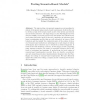158
Voted
FASE
2007
Springer
15 years 8 months ago
2007
Springer
The analysis of the evolution of software systems is a useful source of information for a variety of activities, such as reverse engineering, maintenance, and predicting the future...
129
Voted
FASE
2007
Springer
15 years 8 months ago
2007
Springer
We use 63 features extracted from sources such as versioning and issue tracking systems to predict defects in short time frames of two months. Our multivariate approach covers aspe...
108
click to vote
FASE
2007
Springer
15 years 8 months ago
2007
Springer
Abstract. In this paper we present a layered architecture for modeling workflows in Mobile Ad-Hoc NETworks (manets) using algebraic higher order nets (aho nets). manets are networ...
117
Voted
FASE
2007
Springer
15 years 8 months ago
2007
Springer
Although unit tests are recognized as an important tool in software development, programmers prefer to write code, rather than unit tests. Despite the emergence of tools like JUni...
122
Voted
FASE
2007
Springer
15 years 8 months ago
2007
Springer
Aspects are defined as well-modularized crosscutting concerns. Despite being a core tenet of Aspect Oriented Programming, little research has been done in characterizing and measur...
108
Voted
FASE
2007
Springer
15 years 8 months ago
2007
Springer
The play-in/play-out approach suggests a new paradigm for system development using scenario-based requirements. It allows the user to develop a high level scenario-based model of t...
150
Voted
FASE
2007
Springer
15 years 8 months ago
2007
Springer
The synthesis of object behaviour from scenarios is a well-known and important issue in the transition from system analysis to system design. We describe a model transformation pro...
94
Voted
FASE
2007
Springer
15 years 8 months ago
2007
Springer
We report on S2A, a compiler that translates Modal UML Sequence Diagrams (MSDs), a UML-compliant version of Live Sequence Charts (LSCs), into AspectJ code. It thus provides full co...
95
Voted
FASE
2007
Springer
15 years 8 months ago
2007
Springer
Abstract. Development of composed services requires a continues adaptation of the composed service to the changing environment of offered services. Services may no longer be avail...
106
Voted
FASE
2007
Springer
15 years 8 months ago
2007
Springer
Abstract. In model-based development, a formal description of the software (the model) is the central artifact that drives other development activities. The availability of a model...





